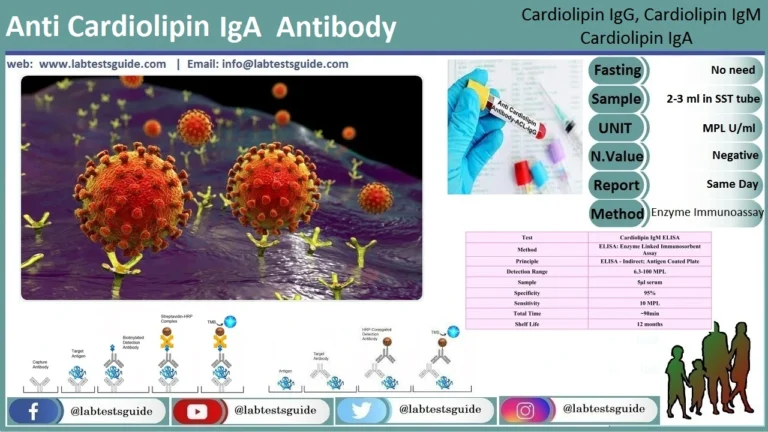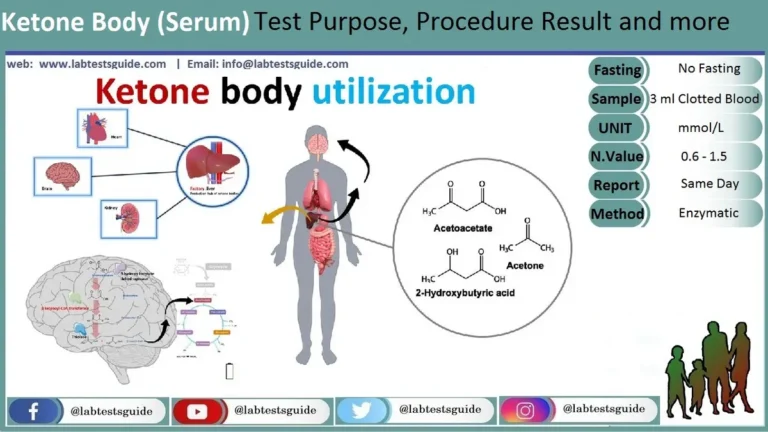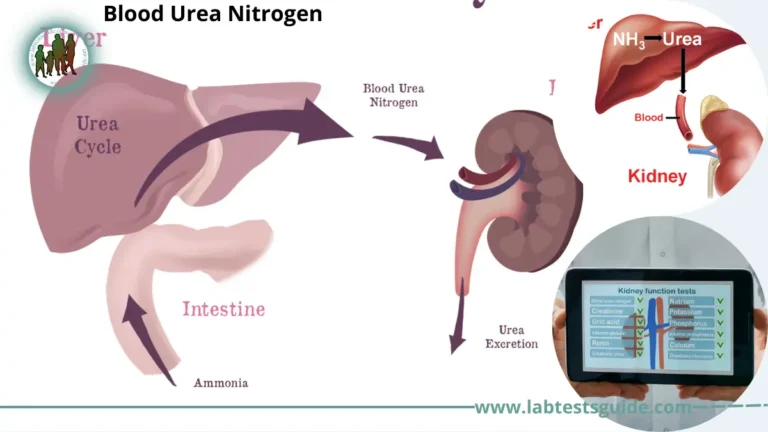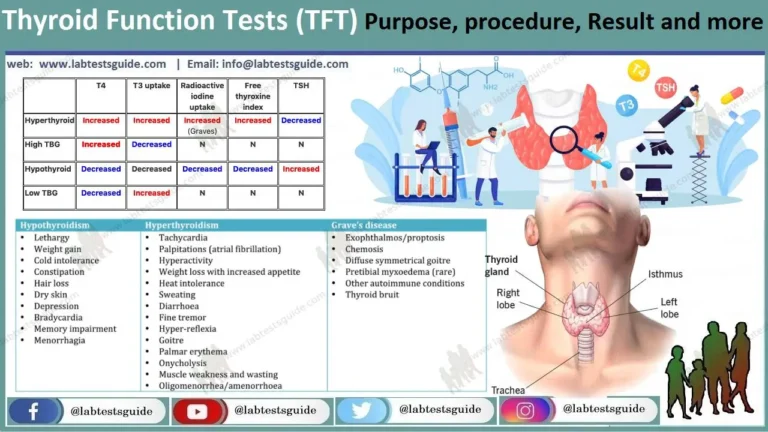A Comprehensive Metabolic Panel (CMP) is a blood test that provides information about your body’s metabolism and the functioning of various organs, particularly the liver and kidneys. It is often used as a part of routine health checkups, monitoring certain medical conditions, or evaluating the effects of medications. The CMP typically includes a set of blood tests that assess different components in your blood.
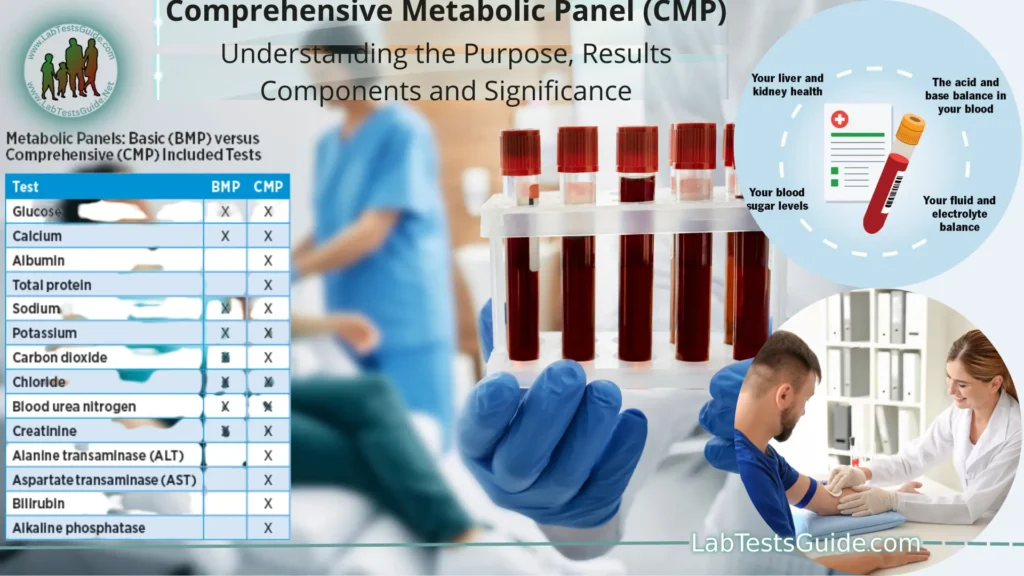
What is a Comprehensive Metabolic Panel?
A Comprehensive Metabolic Panel (CMP) is a blood test that provides a snapshot of your body’s metabolism and the functioning of key organs, such as the liver and kidneys. It measures various substances in your blood, including glucose, electrolytes, proteins, and waste products. The test helps healthcare professionals assess your overall health, detect medical conditions like diabetes, kidney disease, or liver disorders, and monitor the effects of medications. The results guide medical decisions and provide insights into your body’s vital functions.
Purpose and Importance of the Test:
The Comprehensive Metabolic Panel (CMP) serves a crucial purpose in healthcare diagnostics, offering valuable insights into your body’s internal processes. Its importance lies in its ability to:
- Assess Organ Function: The CMP evaluates the health of vital organs like the liver and kidneys. Abnormalities in liver enzymes, bilirubin, and creatinine levels can signal potential issues.
- Monitor Chronic Conditions: For individuals with conditions like diabetes, kidney disease, or liver disorders, regular CMPs help monitor disease progression and treatment effectiveness.
- Detect Medical Conditions: The test can identify conditions such as diabetes by measuring blood glucose levels or kidney dysfunction through indicators like BUN and creatinine.
- Guide Treatment Plans: Healthcare providers use CMP results to tailor treatment plans. Abnormal electrolyte levels, for instance, might prompt adjustments in medication or fluid intake.
- Evaluate Medication Impact: Certain medications can affect organ function. A CMP helps monitor any adverse effects and guides necessary adjustments.
- Preoperative Assessment: Before surgeries, CMP results provide critical information about a patient’s organ health, helping medical teams make informed decisions.
- Screen Overall Health: As part of routine checkups, a CMP offers an overview of your metabolic status, enabling early detection of potential issues.
- Predict Health Risks: Abnormalities in the CMP may indicate an increased risk of heart disease or other health complications, prompting further investigation.
- Guide Lifestyle Changes: Elevated levels in components like glucose and cholesterol might signal the need for dietary or lifestyle modifications.
- Empower Preventive Care: Regular CMPs empower individuals to take proactive steps toward maintaining their health and preventing potential complications.
Components of a Comprehensive Metabolic Panel:
The Comprehensive Metabolic Panel (CMP) comprises a set of blood tests that collectively provide a detailed overview of your body’s metabolic and organ functions. The key components of a CMP include:
- Glucose: Measures the amount of sugar (glucose) in your blood. Elevated levels can indicate diabetes or impaired glucose regulation.
- Calcium: Assesses the level of calcium in your blood, which is vital for bone health, nerve function, and muscle contraction.
- Sodium and Potassium: Electrolytes crucial for maintaining fluid balance, nerve function, and muscle activity.
- Chloride: An electrolyte that, along with sodium, helps maintain proper fluid and electrolyte balance.
- Carbon Dioxide (CO2): Measures the level of bicarbonate in your blood, providing insight into your body’s acid-base balance and respiratory function.
- Blood Urea Nitrogen (BUN): Reflects the amount of nitrogen in your blood from urea, a waste product created by the liver. Elevated levels can indicate kidney dysfunction or dehydration.
- Creatinine: Assesses kidney function by measuring the waste product creatinine in your blood. Elevated levels can indicate kidney issues.
- Albumin: Measures the amount of albumin, a protein produced by the liver that plays a role in maintaining blood volume and transporting substances.
- Total Protein: Measures the overall amount of proteins in your blood, including albumin and globulins.
- Bilirubin: Assesses liver health by measuring bilirubin, a waste product from the breakdown of red blood cells.
- Alkaline Phosphatase (ALP): Enzyme present in the liver, bones, and other tissues. Elevated levels can indicate liver or bone issues.
- Alanine Aminotransferase (ALT): Enzyme primarily found in the liver. Elevated levels can indicate liver damage or disease.
- Aspartate Aminotransferase (AST): Enzyme present in the liver, heart, and other tissues. Elevated levels may suggest liver or heart issues.
Preparing for a CMP:
Preparing for a Comprehensive Metabolic Panel (CMP) often involves a few important steps to ensure accurate and meaningful test results. Here’s how to prepare:
- Fasting Requirements: Depending on your healthcare provider’s instructions, you might need to fast for at least 8 to 12 hours before the test. Fasting means refraining from eating or drinking anything except water during this period. Fasting helps ensure that the results are not affected by recent meals or beverages.
- Medication Considerations: Inform your healthcare provider about any medications you’re taking, including prescription drugs, over-the-counter medications, and supplements. Some medications can impact the test results, so your provider might advise you to adjust your medication schedule or temporarily stop certain medications before the test.
- Hydration: Drinking water is usually allowed during the fasting period, and it’s encouraged to stay hydrated. However, avoid excessive consumption of water right before the test, as it might dilute certain components in your blood.
- Alcohol and Caffeine: Avoid consuming alcohol for at least 24 hours before the test, as it can affect liver enzyme levels. Caffeine consumption generally doesn’t need to be restricted, but check with your healthcare provider to be sure.
- Exercise: Strenuous exercise before the test can affect certain components in your blood. It’s best to avoid vigorous physical activity on the day of the test.
- Consult Your Healthcare Provider: Always follow the specific instructions provided by your healthcare provider. They might have personalized recommendations based on your medical history and the purpose of the test.
- Stay Informed: Make sure you understand the fasting requirements, timing, and any other specific instructions provided by your healthcare provider. This will help you be well-prepared for the test and ensure accurate results.
- Appointment Scheduling: Schedule your CMP appointment at a convenient time when you can adhere to the fasting requirements without discomfort.
Remember, accurate test results depend on proper preparation. If you have any questions or concerns about how to prepare for the CMP, don’t hesitate to reach out to your healthcare provider or the laboratory conducting the test.
Procedure and Sample Collection:
The procedure for a Comprehensive Metabolic Panel (CMP) involves the collection of a blood sample, which is then analyzed in a laboratory. Here’s what you can expect during the procedure and sample collection process:
- Preparation: If fasting is required, make sure you have abstained from eating and drinking (except water) for the recommended time frame, typically 8 to 12 hours before the test.
- Check-In: Arrive at the healthcare facility or laboratory where the test will be conducted. Check in with the front desk or receptionist.
- Verification: The healthcare provider or technician will likely verify your identity and confirm your personal details to ensure that the right test is being performed.
- Blood Sample Collection:
- Selection of Site: A tourniquet will be tied around your upper arm to make your veins more visible. Usually, the inside of your elbow is the preferred site for blood draw.
- Cleaning the Area: The area will be cleaned with an antiseptic to prevent infection.
- Needle Insertion: A sterile needle will be inserted into a vein. You might feel a brief pinprick or discomfort.
- Blood Collection: Blood will be drawn into a collection tube attached to the needle. Multiple tubes might be filled with the required amount of blood for various tests.
- Needle Removal: Once the blood has been collected, the needle will be removed from your arm.
- Pressure and Bandage: A cotton ball or gauze pad will be placed over the puncture site, and pressure will be applied to stop any bleeding. A bandage will be placed over the site to keep it clean.
- After the Procedure:
- Recovery: You might be asked to keep pressure on the puncture site for a few minutes to minimize bruising or bleeding.
- Rest: Take a moment to rest if you feel lightheaded or dizzy after the blood draw.
- Hydration: Drink water to help your body recover from the blood loss.
- Post-Procedure Instructions: You’ll receive any necessary post-procedure instructions from the healthcare provider. These might include guidelines on removing the bandage and caring for the puncture site.
- Results: The collected blood samples will be sent to a laboratory for analysis. Your healthcare provider will receive the results, which will be interpreted in the context of your medical history and overall health.
Normal Values:
Here are the typical normal values for each component in a CMP:
- Glucose: 70 to 100 mg/dL (3.9 to 5.6 mmol/L)
- Calcium: 8.4 to 10.2 mg/dL (2.1 to 2.55 mmol/L)
- Sodium: 135 to 145 mmol/L
- Potassium: 3.5 to 5.0 mmol/L
- Chloride: 98 to 106 mmol/L
- Carbon Dioxide (CO2): 23 to 29 mmol/L
- Blood Urea Nitrogen (BUN): 7 to 20 mg/dL (2.5 to 7.1 mmol/L)
- Creatinine: 0.6 to 1.3 mg/dL (53 to 115 µmol/L) for males; 0.5 to 1.1 mg/dL (44 to 97 µmol/L) for females
- Albumin: 3.4 to 5.4 g/dL
- Total Protein: 6.0 to 8.3 g/dL
- Bilirubin: Less than 1.2 mg/dL (20.5 µmol/L)
- Alkaline Phosphatase (ALP): 44 to 147 IU/L
- Alanine Aminotransferase (ALT): 7 to 56 IU/L
- Aspartate Aminotransferase (AST): 10 to 40 IU/L
It’s important to note that these values can vary based on factors such as age, gender, and individual health conditions. Additionally, laboratories might have slightly different reference ranges, so the specific values provided by your healthcare provider are the ones to consider.
Interpreting CMP Results:
Interpreting Comprehensive Metabolic Panel (CMP) results involves understanding the values of various components in the context of your health, medical history, and other factors. Here’s a general guide to help you understand how to interpret CMP results:
- Reference Ranges: CMP results are typically presented alongside reference ranges, which are the normal or expected values for each component. These ranges can vary slightly based on the laboratory and the units of measurement used.
- Normal Results: Components within the reference range are considered normal and indicate that your metabolic and organ functions are within a healthy range.
- Abnormal Results: Abnormal values that fall outside the reference range may indicate underlying health issues. It’s important to note that a single abnormal result does not necessarily mean you have a serious medical condition—it might be due to temporary factors, medications, or other reasons.
- Context Matters: Your healthcare provider will consider your overall health, medical history, symptoms, and other test results when interpreting CMP findings.
- Component Interpretation:
- Glucose: Elevated glucose levels may suggest diabetes or impaired glucose tolerance.
- Calcium: Abnormal calcium levels can indicate bone disorders, kidney problems, or issues with parathyroid function.
- Electrolytes (Sodium, Potassium, Chloride): Imbalances in these electrolytes can impact fluid balance, nerve function, and more.
- BUN and Creatinine: Elevated BUN and creatinine levels can signal kidney dysfunction.
- Albumin and Total Protein: Abnormal protein levels might reflect liver or kidney issues, malnutrition, or other conditions.
- Bilirubin: High bilirubin levels might suggest liver disease or issues with red blood cell breakdown.
- ALP, ALT, AST: Elevated enzyme levels can indicate liver or bone disorders, and AST levels can provide insight into heart health.
- CO2: Abnormal CO2 levels can suggest issues with acid-base balance or lung function.
- Consult a Healthcare Provider: If you have abnormal CMP results, your healthcare provider will guide you through the next steps, which might include further testing, additional medical evaluation, or lifestyle changes.
- Monitoring and Follow-Up: For individuals with chronic conditions or minor abnormalities, periodic CMPs might be recommended to monitor changes over time.
- Open Communication: Discuss your CMP results and any concerns with your healthcare provider. They are best equipped to explain the significance of your results in relation to your health.
Uses and Applications of CMP:
The Comprehensive Metabolic Panel (CMP) serves various important uses and applications in healthcare, providing valuable information about a person’s metabolic status and organ function. Here are some of the key uses and applications of the CMP:
- Routine Health Checkups: The CMP is commonly included in routine health screenings to assess overall health and detect potential underlying medical issues.
- Monitoring Chronic Conditions: Individuals with chronic conditions like diabetes, kidney disease, or liver disorders may undergo regular CMP tests to monitor the progression of their conditions and the effectiveness of their treatments.
- Medication Monitoring: Some medications can impact organ function. Regular CMP tests help healthcare providers monitor the effects of medications on organs like the liver and kidneys.
- Preoperative Assessments: Prior to undergoing surgery, a CMP can provide crucial information about a patient’s organ function, helping medical teams make informed decisions about anesthesia and the overall suitability for surgery.
- Detecting Diabetes: The CMP’s measurement of blood glucose levels is a primary tool in diagnosing and monitoring diabetes and other glucose-related disorders.
- Kidney Function Evaluation: The levels of blood urea nitrogen (BUN) and creatinine in the CMP offer insights into kidney function, helping diagnose kidney diseases and assessing the kidneys’ ability to filter waste products.
- Liver Health Assessment: Abnormalities in components like bilirubin, alkaline phosphatase (ALP), alanine aminotransferase (ALT), and aspartate aminotransferase (AST) can indicate liver disorders or disease.
- Electrolyte Balance: The CMP’s assessment of electrolyte levels (sodium, potassium, chloride) helps diagnose and manage conditions related to electrolyte imbalances.
- Acid-Base Balance: The carbon dioxide (CO2) measurement provides insight into the body’s acid-base balance, helping diagnose respiratory and metabolic conditions.
- Nutritional Assessment: Components like albumin and total protein levels can indicate nutritional status, malnutrition, and certain liver or kidney issues.
- Cardiovascular Risk Assessment: Abnormalities in components like glucose, cholesterol, and triglycerides can signal an increased risk of cardiovascular diseases.
- General Health Screening: The CMP provides a comprehensive overview of various bodily functions, assisting in the early detection of potential health issues.
- Personalized Treatment Plans: Based on the results of the CMP, healthcare providers can tailor treatment plans, medications, and lifestyle recommendations to suit the individual’s needs.
- Preventive Care: Regular CMP tests empower individuals to take proactive steps toward maintaining their health, preventing complications, and making necessary lifestyle changes.
Limitations and Considerations:
While the Comprehensive Metabolic Panel (CMP) provides valuable insights into a person’s health, there are certain limitations and considerations to keep in mind when interpreting its results:
- Context is Key: CMP results should always be interpreted in the context of the individual’s overall health, medical history, and other relevant factors. Abnormal results may require further testing to confirm diagnoses.
- Not a Standalone Diagnosis: A single abnormal result does not definitively diagnose a specific condition. Additional tests and clinical evaluation are often necessary for accurate diagnosis.
- Variability: Normal reference ranges can vary between laboratories and populations. Always rely on the reference ranges provided by the laboratory that conducted your test.
- Temporary Factors: Factors such as recent meals, dehydration, medication use, and stress can temporarily affect CMP results. Discuss these factors with your healthcare provider.
- Interference: Certain medications, supplements, and medical conditions can interfere with CMP results. Be sure to inform your healthcare provider about any medications you’re taking.
- Kidney Function: While the CMP assesses kidney function, it’s not a substitute for more specialized tests (e.g., creatinine clearance) in certain clinical situations.
- Liver Function: The CMP provides basic information about liver function, but more specific liver function tests might be needed for a comprehensive assessment.
- Clinical Correlation: CMP results should be correlated with the individual’s symptoms and clinical findings to determine their significance.
- Acute vs. Chronic Conditions: Some CMP abnormalities can indicate acute or chronic conditions. Further evaluation is needed to distinguish between these scenarios.
- Age and Gender: Reference ranges might differ based on age and gender. Children and elderly individuals might have different normal values.
- Pregnancy: Pregnancy can affect CMP results, particularly due to changes in kidney function.
- Limited Genetic Information: The CMP does not provide genetic information or identify genetic disorders.
- Non-Specificity: Certain CMP abnormalities, like elevated liver enzymes, can occur in multiple conditions. Additional tests are needed for a definitive diagnosis.
- Limitations of Components: Some CMP components might not be sensitive enough to detect certain diseases or conditions.
- Monitoring Progress: While CMP tests are valuable for monitoring, trends over time are often more informative than single results.
- Healthcare Provider Expertise: Accurate interpretation of CMP results requires the expertise of a qualified healthcare provider.
Always consult your healthcare provider to properly understand and interpret CMP results in relation to your health and medical history. They will guide you through the appropriate steps based on your individual circumstances.
FAQs:
What is a CMP?
A Comprehensive Metabolic Panel (CMP) is a blood test that assesses various components in your blood to evaluate your body’s metabolism and the functioning of organs like the liver and kidneys.
What does a CMP test for?
A CMP tests for glucose, electrolytes (sodium, potassium, chloride), kidney function markers (BUN, creatinine), liver function markers (ALP, ALT, AST, bilirubin), proteins (albumin, total protein), and indicators of acid-base balance (CO2).
How is a CMP different from a Basic Metabolic Panel (BMP)?
A BMP is a subset of the CMP and includes tests for glucose, electrolytes, and kidney function. The CMP includes these tests plus additional markers related to liver function, proteins, and more.
Do I need to fast before a CMP?
Fasting requirements vary. In many cases, fasting for 8 to 12 hours before the test is recommended for accurate glucose and lipid measurements.
Can medications affect CMP results?
Yes, some medications can impact CMP results. Inform your healthcare provider about all medications you’re taking before the test.
What do abnormal CMP results mean?
Abnormal results may indicate various health issues. Further evaluation is needed to determine the underlying cause and appropriate actions.
Can CMP results diagnose specific conditions?
While CMP results can provide valuable insights, they typically require further testing and clinical evaluation to diagnose specific conditions.
How often should I have a CMP done?
Frequency depends on your health status and medical history. For individuals with chronic conditions, regular monitoring might be recommended.
Can I exercise before a CMP test?
Strenuous exercise before the test can impact certain components. It’s best to avoid vigorous activity on the day of the test.
What can cause temporary abnormalities in CMP results?
Recent meals, dehydration, medication use, and stress can temporarily affect CMP results.
Is fasting required for all CMP components?
Fasting is mainly required for glucose and lipid measurements. Consult your healthcare provider for specific fasting guidelines.
Can a CMP detect diabetes?
Yes, elevated glucose levels in a CMP can indicate diabetes or impaired glucose tolerance.
Can I drink water before a CMP test?
Generally, water intake is allowed during fasting periods. However, avoid excessive water consumption just before the test.
Can CMP results help assess my heart health?
Yes, components like glucose and cholesterol levels in the CMP can provide insights into cardiovascular health.
Is a CMP painful?
The blood draw might cause a brief pinprick or discomfort. Most people find it tolerable.
Can CMP results be affected by pregnancy?
Yes, pregnancy can affect CMP results, particularly due to changes in kidney function.
Can I get a CMP without a doctor’s order?
In most cases, a healthcare provider’s order is required to get a CMP test.
Conclusion:
In conclusion, the Comprehensive Metabolic Panel (CMP) serves as a vital tool in modern healthcare, providing a comprehensive snapshot of metabolic processes and organ function. Its wide-ranging components offer insights into diverse aspects of health, from glucose regulation and electrolyte balance to kidney and liver performance. As a valuable diagnostic and monitoring tool, the CMP empowers both individuals and healthcare professionals to make informed decisions about preventive care, treatment strategies, and overall well-being.
Possible References Used


